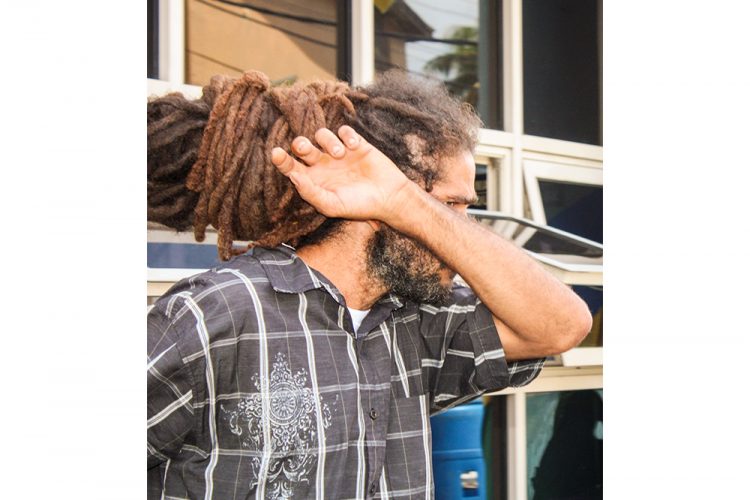Why aren’t prisoners on remand allowed to vote? – Magistrate

by Katherine Renton
Prisoners undergoing any sentence of imprisonment cannot register to vote, according to the Representation of the People Act (RPA); but the question has been raised as to why arrangements can’t be made for prisoners on remand, who have not yet been pronounced guilty, to vote.
St Vincent and the Grenadines is two days away from the general elections of November 5, and the question is up in the air for prisoner Larry Abbott concerning whether he will be able to vote this Thursday.
The defendant pleaded not guilty to the charge that, on October 30, in Green Hill, he unlawfully and maliciously wounded Kimolorn Spencer, a 33-year-old of Green Hill.
Abbott allegedly shot Spencer in the back with a fish gun.
The prosecution has objected to Abbott’s bail, because his alleged victim is still hospitalized. They originally asked for the defendant to be remanded, and for the bail review be set for next Monday, November 9, when there would be an update on Spencer’s medical status.
Following this application, Senior Magistrate Rickie Burnett asked, “Persons who are on remand, can they vote on Thursday?”
There wasn’t a definite answer at that point, but there was a suggestion that they could not.
Following this, Prosecutor Renwick Cato indicated that he wanted to change his application, and asked for the bail review to be held on Wednesday, November 4 instead.
While the court matter may have been concluded for now, Burnett noted that the matter was still on his mind concerning persons on remand.
“A person is on remand, they have not been convicted of any crime,” as yet, he stated, “they are presumed to be innocent until proven guilty.” So why can’t they vote, he mused, asking Corporal 664 David Wright if he had the answer.
“No your honour, what I know from my 22 years in the service, is that I have never seen it done,” the Corporal responded.
“…They are not doing a sentence. The court has not pronounced,” on their innocence or guilt, the magistrate stated.
“I believe the norm is that once you are there at Her Majesty’s pleasure, you lose that right,” Wright voiced.
“You are there because the court asked you to be there, not that you want to be there, the court remand you until your matter is called…,” Burnett stated. However, he added that there may be a good reason for it, and he also resolved to ask another legal practitioner should they come into the courtroom.
The magistrate said that it looked “kind of wrong” to him.
“Because the person (on remand) may well come to court and you may hear that the prosecution is no longer proceeding, or the complainant is no longer proceeding, or the court may deem the person to be not guilty…and the person has been denied an opportunity to cast their vote,” the magistrate listed.
Counsel Ronald Marks entered the courtroom not long after this discussion, and the subject was brought to his attention.
Marks acknowledged that the person would not have been sentenced by the court, but “the difficulty is that how is that going to be made possible? Is that the responsibility of the prison authorities? Would there have to be an application before the court for special measures, was also pondered.
The magistrate pointed out that for some persons in quarantine something is being done for them to be able to vote.
It was decided last week that persons from Day 6 to Day 14 into their quarantine will be granted a medical officer’s order which will specifically state that they can vote between 5 and 5:30 pm. Although the RPA stipulates that voting must be between 7 am and 5 pm, the Chief Medical Officer, Dr Simone Keizer-Beache, has indicated that she has been advised that once there is consensus, there can be a statutory rule and order declaring an extension of the time.
Counsel Marks commented that this would be different to those persons being kept at Her Majesty’s pleasure. However, he said “It’s a good matter to be tested,” because of the question of the exercising of constitutional rights.
The RPA, under the heading “Qualification of voters”, section 6 outlines that “a person is disqualified from being registered as a voter and shall not be so registered if he – (b) is undergoing any sentence of imprisonment in Saint Vincent and the Grenadines.”
Further, the section disqualifies persons found or declared to be of unsound mind or who are patients in an establishment for the treatment of persons suffering from mental illness. It disqualifies those individuals under sentence of death imposed by a competent court in any part of the Commonwealth or “under sentence of imprisonment (by whatever name called) exceeding twelve months imposed on him by such a court or under some sentence substituted therefore by a competent authority and has not suffered the punishment to which he was sentenced or has not received a free pardon therefor”. And lastly, any person who is under any law, disqualified from being registered as a voter, shall not be registered to vote.
A reliable source at Her Majesty’s Prisons told SEARCHLIGHT that it’s not customary for inmates to vote, “For the duration of my time here it has never happened; I don’t think it will be different this time.”
“I know once you’re in prison, it’s not customary that you vote,” the official reiterated.












